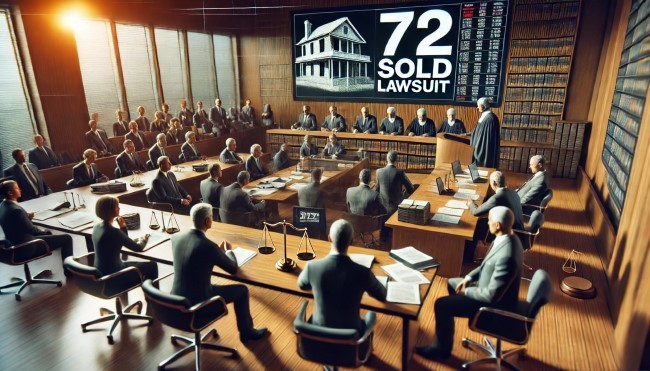A whole new dimension has been added to the world of buying and selling houses. A lawsuit filed by 72 Sold has sparked heated debates about the truth in advertising, how to hold companies accountable, and how to play the game as a real estate agent. Getting houses sold fast while maintaining the integrity of the entire system is being put to the test by this case.
What is the 72 Sold Concept?

An unconventional approach to selling properties is at the heart of the controversy surrounding 72 Sold. As a pioneer in the Arizona real estate industry, 72 Sold was founded in 2018 by Greg Hague, a prominent figure in the state’s real estate scene. 72 Sold markets itself as a revolutionary service that facilitates the sale of a home in as little as eight days.
In the United States, 72Sold primarily operates in 38 markets. Using an auction-like strategy to generate buzz and drive buyer interest, 72 Sold utilizes a partnership with Keller Williams brokerage to reach a nationwide audience. Real estate investors and homeowners alike have been attracted to this unique selling proposition.
The Allegations: Unveiling the 72 Sold lawsuit
A series of allegations underlie the 72 Sold lawsuit that attack the company’s operations and ethics. It is claimed that 72 Sold has engaged in misleading advertising practices, failing to consistently meet its promise to sell properties within eight days as advertised.
The commissions and fees charged by 72 Sold have also been highlighted in the lawsuit. 72 Sold may have engaged in deceptive practices related to its commission structure and fees, potentially causing financial harm to buyers and sellers.
Furthermore, the lawsuit claims that the company concealed important information about the company from homeowners. There are also hidden fees and charges that are not disclosed upfront by the company. Clients faced with unexpected costs have been dissatisfied as a result of their lack of transparency.
The Parties Involved

A variety of stakeholders are involved in the 72 Sold lawsuit, each with their own interests and perspectives. A swift sale of their properties is at the center of the legal proceedings between 72 Sold and the homeowners who enlisted the firm’s services. As a result of the company’s marketing claims, these individuals claim that they were misled and that the level of service and transparency they were promised were not provided.
Greg Hague, 72 Sold’s founder, stands on the opposite side. Other key members of the company’s management and operations are also included. In addition, consumer protection agencies and regulatory bodies have taken note of the lawsuit.
Read: MyDearQuotes.com
Read: Unveiling Urlebird
Read: Netwyman Blogs
Read: Make1m.com
Read: Crypto30.com
Read: Bart Springtime
Read: Crypto30x.com Zeus
Read: What Money6x.com Can Do for Your Earnings in 2024?
Conclusion
Real estate is shaking under the weight of the 72 Sold lawsuit. Established practices are put on display, forcing a hard look at ethical boundaries. It is possible that the case will reshape industry norms as it unfolds beyond the courtroom.
Whether this lawsuit succeeds or fails, it is a wake-up call for the industry.
The 72 Sold lawsuit: Frequently Asked Questions
How can buyers and sellers protect themselves against the 72 Sold lawsuit?
Real estate companies should be treated with caution and due diligence by buyers and sellers. In addition, all documentation must be carefully reviewed, legal advice sought, and information provided verified for accuracy.
In what ways could 72 Sold affect the real estate industry long-term?
The 72 Sold lawsuit could lead to
- Increased regulatory scrutiny
- Changes in industry practices
- Heightened consumer awareness about the risks associated with real estate investments.
- Prompt the implementation of stricter disclosure requirements,
- Enhance consumer protection laws and more stringent oversight of real estate transactions.
In what ways might the outcome of the 72 Sold lawsuit impact consumer confidence?
Consumer confidence in the real estate market could either be boosted or eroded by the outcome of the 72 Sold lawsuit. Consumers may lose trust in unconventional selling practices if the allegations prove true.
A successful defense by 72 Sold, however, could strengthen the legitimacy of innovative approaches within the industry.
Is there anything regulators and policymakers can do to address the issues raised by the 72 Sold lawsuit?
By strengthening consumer protection laws, improving transaction oversight, and increasing transparency, they can protect consumers.
What has been the impact of similar lawsuits in the past on the real estate market?
There have been reforms in the real estate industry as a result of past lawsuits alleging fraud. Regulations will be changed, disclosure requirements will be increased, and market participants will be held more accountable. Litigations have often enhanced consumer protection, improved standards, and restored trust in the industry.










